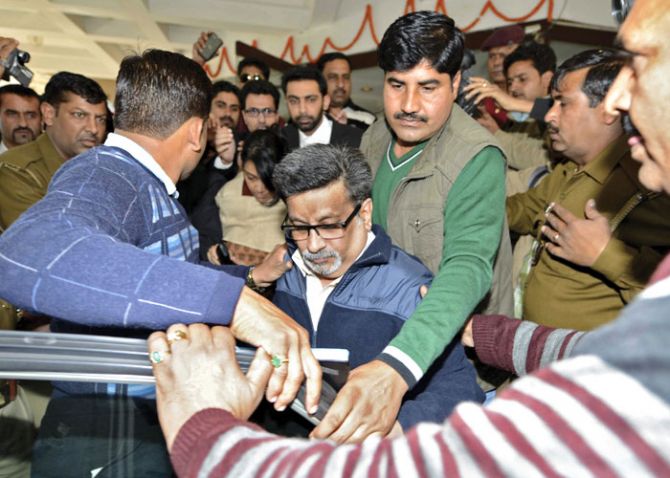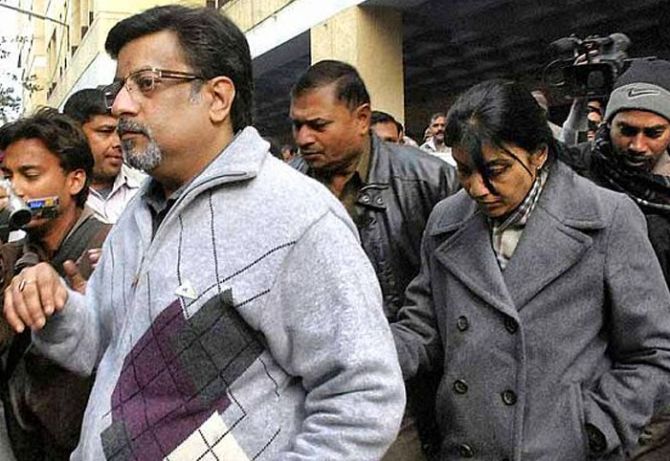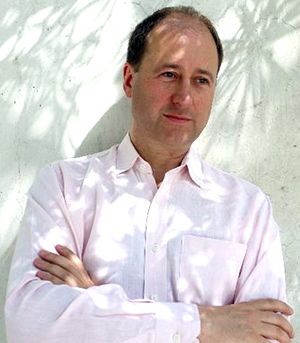'When they are released their daughter will still be dead. Nothing can be done to change that'
'I have not met one person who has investigated the case in any detail and concluded that they were guilty'
British historian and writer Patrick French, who profiled Nupur and Rajesh Talwar and the case against them in his book India, A Portrait, speaks to Vaihayasi Pande Daniel/Rediff.com about their acquittal.

British historian and writer Patrick French, who has made India his home, first met Rajesh Talwar in around 2009.
Talwar was the dentist of his wife Meru Gokhale's family and French, who was living in Delhi at the time, needed dental work and his family suggested he make a trip to the dentist’s clinic in central Delhi.
A year earlier, French woke up to the news from his family that the dentist’s 13-year-old daughter Aarushi had been murdered in her Jalvayu Vihar, Noida home. When he met him the first time, the writer recalls, “We didn’t discuss the case. It was just a visit to the dentist. I knew that he had been through a personal tragedy.”
As French, who earlier this year became the dean, School of Arts and Sciences, Ahmedabad University, told Rediff.com some years ago: “Can there be anything worse than your child being killed?”
French was slowly to discover that there can still be much, much worse things that can happen to the ill-fated parents, whose only child has been murdered.
In dismay and shock, he witnessed the awful misfortunes that continued, in a surreal manner, to stack up against his dentist and wife.
The discovery of the body of their long-standing Nepali help Hemraj Banjade. A badly-botched investigation into their daughter’s murder. No hope perhaps of her killers being brought to book.
Horror of horrors, the investigators then in a 'Kafkaesque' fashion turned on the grieving parents and accused them of the murder.
Character assassination followed, even of their poor dead teenage daughter, that was lapped up by a scandal-hungry section of the media. The dentist, who French described earlier as 'bearded, avuncular man, who had gentle hands even when he was probing your molars', was even stabbed with a cleaver outside a Ghaziabad court by a youth.
And finally in 2013, a guilty verdict and a sentence of life imprisonment for Talwar and his wife.
French told Rediff.com then, "Because the CBI was unable to investigate and find the murderer, they prosecuted Dr Rajesh Talwar whom I know because he is my dentist and I know the case in great detail. I know he is an innocent man... You are accused of the murder on the basis of completely bogus evidence!"
Deeply disturbed by this enormous tragedy, French spent a couple of years putting together the story of the Talwars, speaking to them, their dear ones and friends.
He added a chapter on the calamity that befell the Talwars in his 2011 book India, A Portrait. It begins with the lines, 'For Rajesh and Nupur Talwar, a middle class couple who employed a cook and a maid, the lack of knowledge about the people in their home was to destroy their lives -- aided and exacerbated by the administrative dystopia of the state of Uttar Pradesh... A faithless servant had become a murder victim and tragedy had become a mystery. The country grew riveted by the case. It was a growing media obsession, and everyone became an expert with their own explanation of the double homicide'.
After the publication of his book, an even-handed, sympathetic telling of their sad story, French continued to follow the Talwars' tale, being updated by their friends and family, after they were sent to Dasna jail in November 2013.
In an interview to Vaihayasi Pande Daniel/Rediff.com he speaks about the enormous relief he felt on learning of their acquittal on Thursday, when he read about it online.
Right from the beginning you have always been convinced that the Talwars had been wrongly accused. Why did you feel that way?
Probably because I did very detailed interviews with Nupur and Rajesh Talwar. And (with) different people, like family members, work colleagues, people who knew them.
All of my impressions from that was that they were a very happy, very loving family. That Aarushi was a very well-adjusted, emotionally stable, intelligent 13-year-old girl.
There didn’t appear to be any plausible motive for two loving parents to kill their daughter, who they had devoted their life to. It didn't make sense. Therefore I investigated the case itself in greater detail. There was simply no genuine evidence of any kind to tie them to the murder.
When the media coverage of this case was unfolding, many sections of the media and the public were certain they were guilty. How did the media and average people following the case get it so wrong? Why were they so convinced the Talwars had done it? You have written a lot about India – why do you think people got it so wrong?
Because I think it was a very sensational case at the beginning. The idea of a murder, that then turned into a double murder.
There was a lot of pressure, I think, on the UP police to find an answer to crack the case. It was also partly because it was every family’s worst nightmare. A regular, normal, middle class family, working (people) -- that this could happen to anyone in your home.
When the killing happened it was a time when there was a lot of media, particularly TV media, taking off in India. You had therefore a lot of coverage.
The fact that the case was covered widely was not the problem. The problem was when you had some journalists and some commentators simply either making up false information or reporting information that was noticeably false.
When, for example, there was a press conference quite soon after the killings and a senior police officer made completely outrageous and unfounded sexual allegations about the murdered child, about Aarushi Talwar, these were reported as if they were a reasonable thing for a police officer to claim.
Whereas what should have happened was people should have immediately said: ‘You are making these disgusting allegations about a murdered 13 year old child. Where is the evidence?’ The fact is that there was no evidence and yet still that information was reported as if it was reasonable speculation.
One can understand that the public believes the media. But even so, why were people so gullible to believe all that the media reported? And all kinds of terrible and untrue theories were floating about at the time.
I think you need to ask those people who expressed those opinions at the time.
Ask the people who wrote newspaper articles making allegations against Nupur and Rajesh Talwar.
You need to ask the commentators who made suggestions such as: Oh I think probably the parents could be guilty because when I saw the mother being interviewed on TV she wasn’t crying. She didn’t look upset enough.
You need to get back to the people who said those sorts of things and ask them what their justification is for making these utterly unfounded and deeply distressing allegations against parents who had lost their only daughter.

You are an India watcher. The Talwar case, which took nine years to resolve and for them to get acquitted, what kind of commentary did it make on India?
You know, the thing I feel more than anything now, at the moment, is just great relief, great happiness that Nupur and Rajesh Talwar are going to be released from jail.
Being held in Dasna Jail (Ghaziabad) under a wrong conviction for four years is a terrible experience for anybody.
When they are released their daughter will still be dead. Nothing can be done to change that.
The only ray of hope is the fact that eventually the legal system allowed justice to be done. And they will now be released. It has taken a very long time but I feel some sense of relief on behalf of the parents that now they will be able to walk free. They will also be able to continue their justified campaign to locate and put on trial the actual killer of Aarushi Talwar and Hemraj Banjade.
When was the last time that you saw either of them?
It was a couple of years back when I went to visited them in Dasna Jail.
A terrible meeting?
I kept in touch with them through family members, their lawyers and colleagues and so on. I have kept a very close watch on the case.
Obviously the experience they have gone through is the unbearable pain of losing a child in that circumstance. Then on top of that being falsely accused of the murder and then losing your liberty.
I don’t think any worse experience could happen to anybody.
There has also been the total turnaround by the judiciary in this case. Does it show that ultimately at the higher level justice is served in India?
It appears to be the case. A lot of good lawyers have worked pro bono on this case because they realise there had been a miscarriage of justice.
It took a long time. But now they are free. I guess that is something to be happy about.

As you said, they have gone through so much. But I can see from social media comments that their fight is not over. There are people who think that they still did it. As a reporter what duty do we have to sort of change that view?
My final comment on this would be to say that I have talked to a lot of people over the years -- some of whom believed that the Talwars were guilty and some of whom believed they were not guilty.
I have not met one person who has investigated the case in any detail and concluded that they were guilty.
The fact is that you cannot study this case in detail, you cannot look at the sequence of events in detail and conclude anything other than that they are innocent people.
Will you be meeting them soon?
Yes, I will be meeting them. I was in a meeting (Thursday), came out and read the news online. I was delighted that they will be freed from the torment of imprisonment. But the battle goes on (to find) the real killer.











 © 2025
© 2025